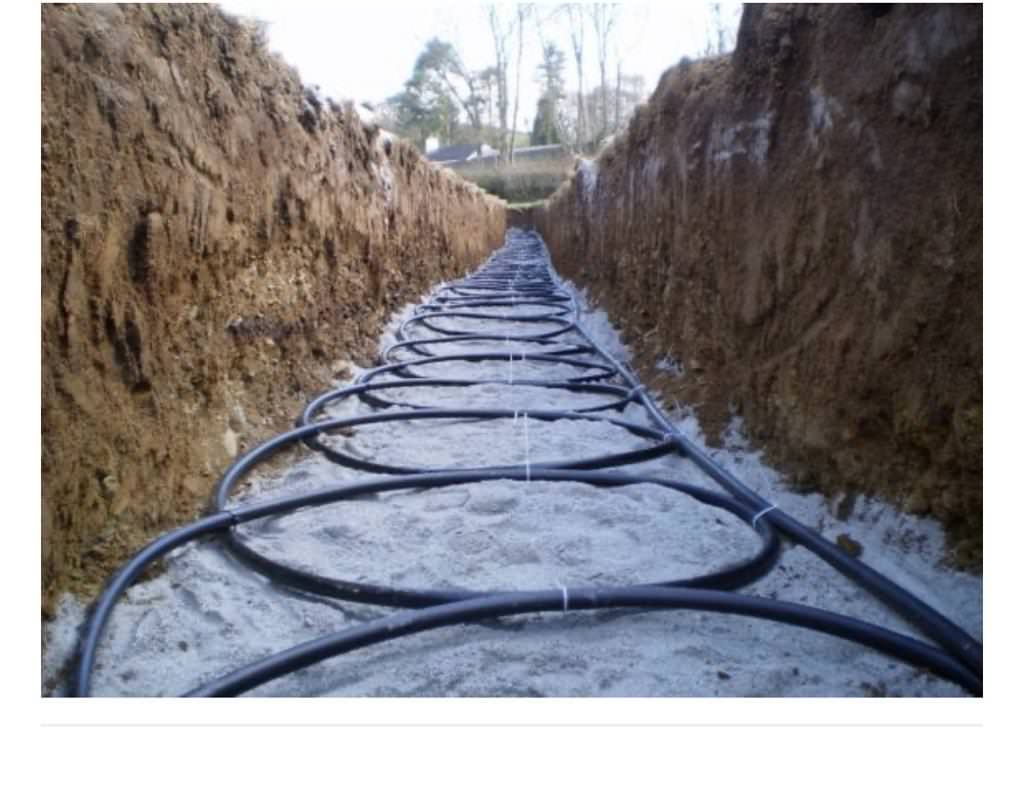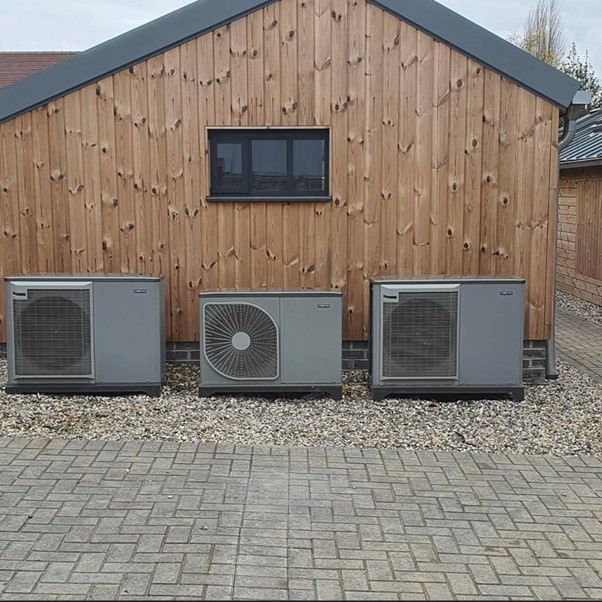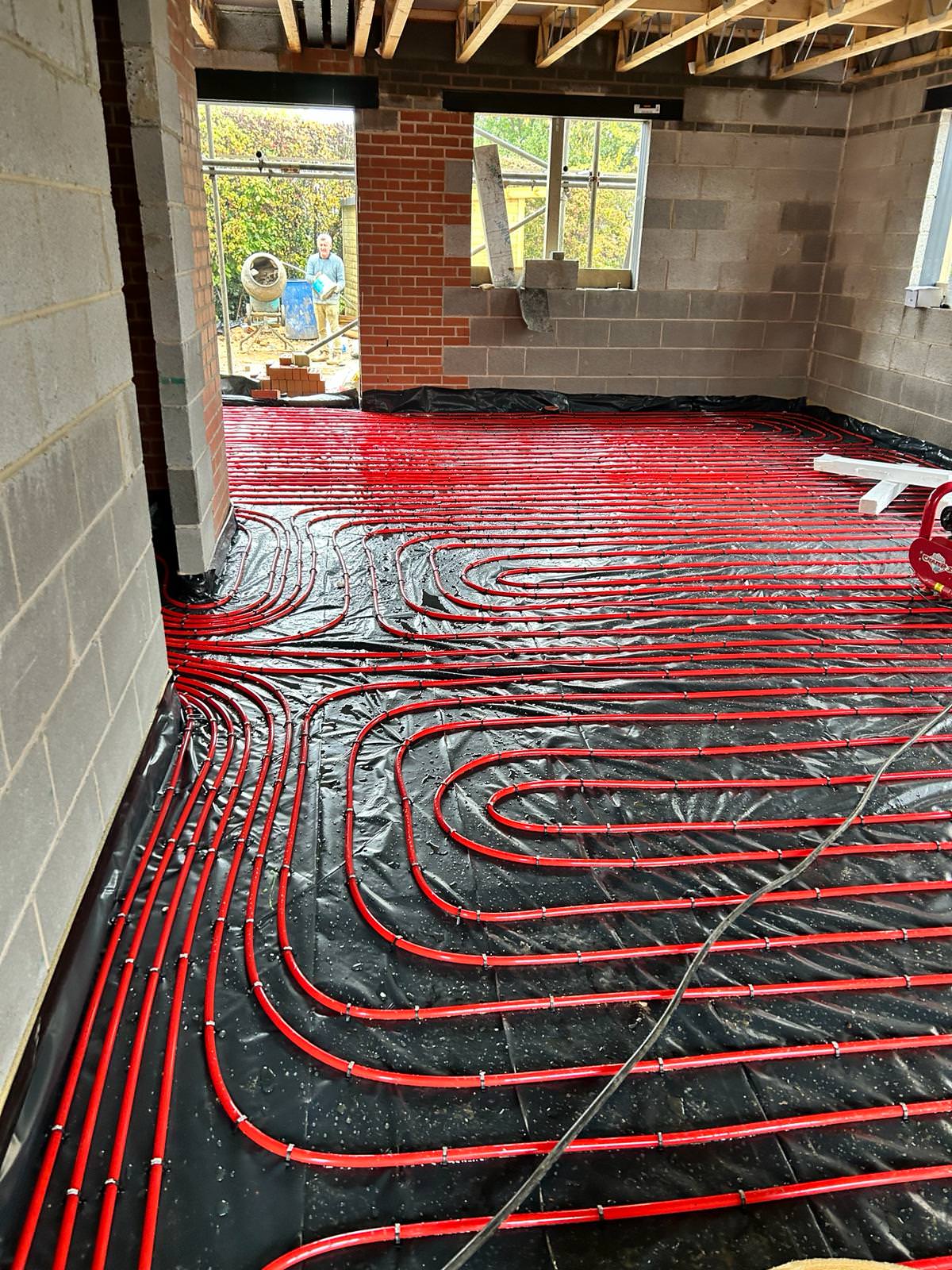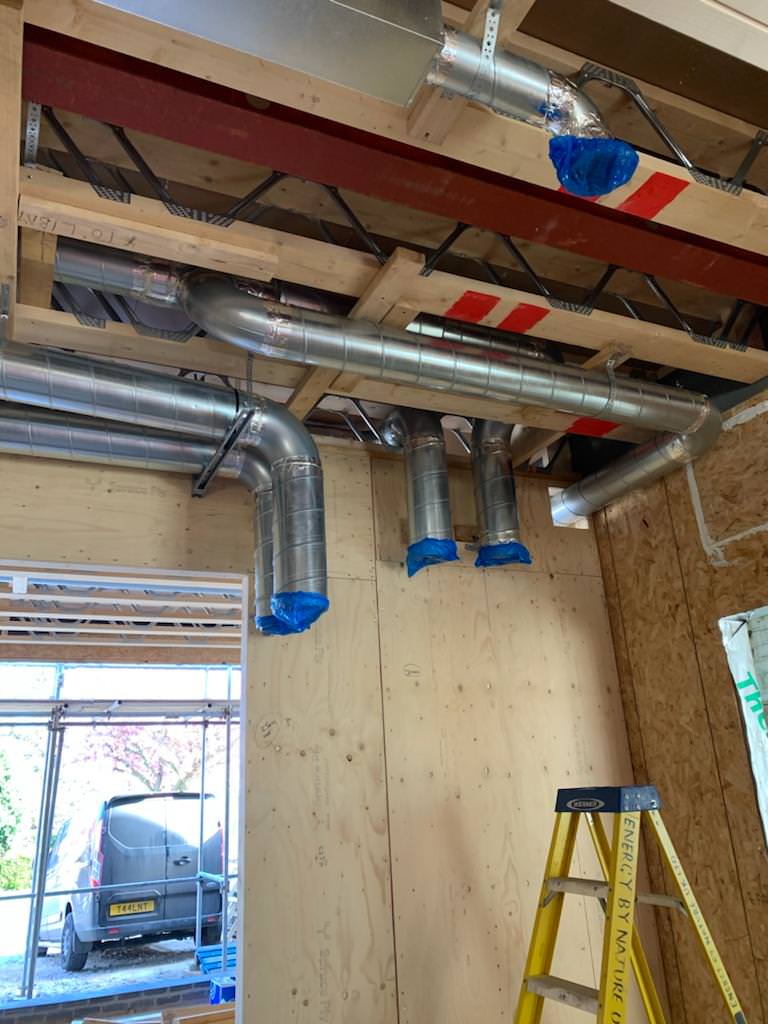Our services
We believe in providing our customers with the best products on the market to match their needs, followed by a friendly and proffesional after sales support to ensure peace of mind for years after our installations have been completed.
Array
Pumps
Heating
Circuits
Conditioning
Heating Controls

About
Ground Source Heat Pumps
What is a ground source heat pump?
A ground source heat pump is a heating unit that extracts energy from the earth via pipe work in the ground and produces the heating and or hot water for a home or building. The heat pump itself is only one part of what you need in a ground source heating system. A typical installation can be broken down into three sections. The ground array, the heat pump, and the heating storage and delivery.
- The ground array: the ground array is where you extract your heat from, typically consisting of plastic pipes buried in the ground, the fluid that pumps around these pipes is cold so that it can extract the warmth from earth around them.
- The Heat pump: This is the heater of the system. Using a refrigeration cycle, the heat pump has a hot and a cold side of its circuit; the hot side is used to heat up water for heating, which can be used for a heating circuit or a hot water cylinder, and the cold side is used to extract the energy from the ground.
- Heating Storage and Delivery: A heat pump isnt an instant water heater. This means that it will heat up water incrementally over time, so for a heat pump to produce usable hot water for sinks, showers and other uses you need to store this pre-heated water in a hot water cylinder. As a part of the installation to prevent the system from running in short bursts you may also need to install an accumulator/buffer tank to store heated water for the heating circuit.
Is a ground source heat pump suitable for me?
Ground source heat pumps are highly efficient systems when installed correctly. There is a criteria to be met for an effective ground source heat pump installation. You need to have a sufficient amount of land for the installation of the ground array, you need to have a suitable amount of space indoors for the installation of the ground source heat pump, and the tanks and other equipment needed. You also need to be heating a home or a space that has a heating delivery system such as radiators, underfloor heating or fan coils that can heat the space at low water temperatures. The criteria for each of these is entirely dependant on the home/building being heated. The only way to accurately calculate what is needed for each of these is by carrying out a full heat loss calculation
What is the installation process?
- Every installation should start with a heat loss calculation to calculate the amount of energy that needs to be produced and the size of the heat pump that is needed to produce it. This also means calculating the size of ground array needed to meet the demand, and that the heating circuit is sized to effectively heat at a low water temperature.
- Once certain that a system can be installed correctly, the next step in the process is to install the ground array, this can be done in a number of ways but it is best to get the part of the process done first.
- Once your ground array has been installed it is finally time to install your ground source heat pump, and any other equipment needed for the installation.
How much is it likely to cost?
The costs of a ground source heat pump vary depending on the size of the installation required, and the system type chosen. Ground source heat pump systems for a domestic home typically range from £10,000 to £35,000.
Why choose Energy by Nature UK?
We have years of experience designing and installing ground source heat pump systems, our in depth knowledge of these systems guides gives our customers peace of mind during the installation process. We are recommended by our customers and suppliers alike.

About
Air Source Heat Pumps
What is an Air Source Heat Pump?
An Air source heat pump is a highly efficient water heater. Heat pumps can produce the hot water and heating needs of a home or commercial building. They use refrigerant technology to absorb energy from the outdoor air through an outdoor unit and transfer this energy to your heating and/or hot water. Consequently, you can typically expect to gain 3-5kW (units of energy) from the outdoor air for every 1kW of electricity used to harness this energy.
Not all Air Source Heat Pumps are the same, and each model has its own conversion rate.
Most of these appliances are designed to generate up to 55 degrees Celsius of Hot water temperature without any other form of boiler/ heating element.
And are typically installed with heating systems designed to operate between 35 and 45 degrees Celsius.
Is an Air Source Heat Pump Suitable for me?
The lower temperature systems are generally more suitable for new build and renovation projects, as the design of the heating system can be considered. This means that the heating system would be designed to operate in the most efficient parameters of the heat pump installed.
When looking to retro fit an air source heat pump in your home, there are usually two options available, one being to upgrade the system you have in place already, such as installing new radiator with higher heating outputs where needed. Another option is to fit a high temperature air source heat pump unit. These Units are designed to operate at higher temperatures similar to those of a conventional fossil fuel boiler.
What is the installation process?
- The first step of the installation process is to design an air source heating system for your home or building. This process starts with a heat loss calculation of the property being heated. Once these calculations have been done a system can be specified to meet the demands of the building.
- If the installation is in an existing building with an existing heat source, the next step in the process is to remove any elements of the previous heating system that are being replaced by the new design. This could include a boiler, radiators that are too small and/or a hot water cylinder.
- Once the existing is removed or in the case of a new build property the third step is to install the heat emitters. These can be radiators, underfloor heating, fan coils or any other appropriate equipment.
- The final step is the installation itself; the outdoor unit needs to be connected to the internal plumbing, and/or equipment. A typical installation can take between a few days and week. Larger or more complex installations can take longer.
How much is it likely to cost?
An air source heat pump installation can vary wildly in cost depending on the property. Typically, an installation will cost between £8,000 and £12,000. These costs vary on a wide variety of factors such as the size of the building, the location of all the equipment, and electrical works that my be required and any upgrading works that may be needed to create an effective system.
Why Choose Energy by Nature UK?
Energy by Nature UK ltd, is an MCS accredited company you can trust. We have over a decade of experience installing air source heat pumps. Our team have worked on a wide range of projects. These projects range from small single-unit domestic installations to large multi-unit commercial projects. With a wealth of experience and in-depth knowledge of the systems we install you will be in very safe hands. Our friendly team is always on hand to help and will guide through the process every step of the way. As a result, we can provide you with a tailor-made system, expert advice and the highest quality of workmanship.

About
Underfloor Heating Systems
How can we help?
At Energy by Nature UK we are always happy to help our customers. We have a wide range of Underfloor heating systems available, and can provide you with a custom proposal for the installation free of charge.
Benefits of Underfloor Heating
Not Sure about wether to have underfloor heating installed in your property? Take a look at the benefits of underfloor heating to learn more about the upsides of underfloor heating systems.
What are the benefits of Underfloor heating?
High Efficiency.
As the name suggests warm water underfloor heating uses a much lower water temperature than conventional radiator systems, combine this with a much more even distribution of heat and the result is a much lower overall running cost of heating your home.
Especially when installed with an Air or ground source heat pump.
Comfortable heating.
Underfloor heating distributes the heat evenly across the whole area of a room. This means no hot/cold spots. Although the surface temperature of the floor would usually only be 25 to 29 degrees Celsius it will take that chill off your floor especially in tiled rooms!
More Space!
Although a radiator doesn’t take up a great deal of space in a room by itself, we have all experienced the deliberations of room layouts considering the fact we have lost valuable wall space to keep from covering up the radiator in a room. With underfloor heating you would never have to worry about this ever again!
Safety!
No sharp metal radiator corners for children to fall and hurt themselves on and no more hot surfaces for little ones to burn themselves on. It is no surprise that schools are opting for underfloor heating as a safer way to heat their buildings.
Add value to your home
Underfloor heating is a popular selling point in any home these days, for all the benefits above. You can add value to your home by opting for underfloor heating whilst in the building stage or whilst you carry out the renovation of your home.
About
Radiator Circuits
As well as the air/ground source heat pump, you will need heat emitters in your property. In many case, when a system is retrofitted, some existing radiators need to be upgraded.
It can be both confusing and stressful having to find different trades to do different sections, so here at Energy By Nature UK Ltd we offer a full package system.
MICROBORE? No problem! We can retrofit radiators to any system no matter what size pipework you have already, making Energy By Nature UK a one stop shop for your complete heating system.

About
Air Conditioning
Air conditioning/heating (Air to Air heat pumps), commonly referred to as air conditioning units, when capable of doing both heating and cooling they are then known as heat pumps.
They have the ability to heat and cool a room creating a comfortable temperature year-round. As they heat/cool the air in a room, the air passes through a filter helping to keep the air clean.
About
Whole Home Heating Controls
Whether you are looking for a simple solution to control your home, or you would like state of the art controls, we can help you!
We can supply you with whatever suits and fits the needs and expectations of your home.
We use Heatmiser controls for your home as standard, but also brands such as Drayton Wiser and TADO.
Array
Pumps
Heating
Circuits
Conditioning
Heating Controls

About
Ground Source Heat Pumps
What is a ground source heat pump?
A ground source heat pump is a heating unit that extracts energy from the earth via pipe work in the ground and produces the heating and or hot water for a home or building. The heat pump itself is only one part of what you need in a ground source heating system. A typical installation can be broken down into three sections. The ground array, the heat pump, and the heating storage and delivery.
- The ground array: the ground array is where you extract your heat from, typically consisting of plastic pipes buried in the ground, the fluid that pumps around these pipes is cold so that it can extract the warmth from earth around them.
- The Heat pump: This is the heater of the system. Using a refrigeration cycle, the heat pump has a hot and a cold side of its circuit; the hot side is used to heat up water for heating, which can be used for a heating circuit or a hot water cylinder, and the cold side is used to extract the energy from the ground.
- Heating Storage and Delivery: A heat pump isnt an instant water heater. This means that it will heat up water incrementally over time, so for a heat pump to produce usable hot water for sinks, showers and other uses you need to store this pre-heated water in a hot water cylinder. As a part of the installation to prevent the system from running in short bursts you may also need to install an accumulator/buffer tank to store heated water for the heating circuit.
Is a ground source heat pump suitable for me?
Ground source heat pumps are highly efficient systems when installed correctly. There is a criteria to be met for an effective ground source heat pump installation. You need to have a sufficient amount of land for the installation of the ground array, you need to have a suitable amount of space indoors for the installation of the ground source heat pump, and the tanks and other equipment needed. You also need to be heating a home or a space that has a heating delivery system such as radiators, underfloor heating or fan coils that can heat the space at low water temperatures. The criteria for each of these is entirely dependant on the home/building being heated. The only way to accurately calculate what is needed for each of these is by carrying out a full heat loss calculation
What is the installation process?
- Every installation should start with a heat loss calculation to calculate the amount of energy that needs to be produced and the size of the heat pump that is needed to produce it. This also means calculating the size of ground array needed to meet the demand, and that the heating circuit is sized to effectively heat at a low water temperature.
- Once certain that a system can be installed correctly, the next step in the process is to install the ground array, this can be done in a number of ways but it is best to get the part of the process done first.
- Once your ground array has been installed it is finally time to install your ground source heat pump, and any other equipment needed for the installation.
How much is it likely to cost?
The costs of a ground source heat pump vary depending on the size of the installation required, and the system type chosen. Ground source heat pump systems for a domestic home typically range from £10,000 to £35,000.
Why choose Energy by Nature UK?
We have years of experience designing and installing ground source heat pump systems, our in depth knowledge of these systems guides gives our customers peace of mind during the installation process. We are recommended by our customers and suppliers alike.

About
Air Source Heat Pumps
What is an Air Source Heat Pump?
An Air source heat pump is a highly efficient water heater. Heat pumps can produce the hot water and heating needs of a home or commercial building. They use refrigerant technology to absorb energy from the outdoor air through an outdoor unit and transfer this energy to your heating and/or hot water. Consequently, you can typically expect to gain 3-5kW (units of energy) from the outdoor air for every 1kW of electricity used to harness this energy.
Not all Air Source Heat Pumps are the same, and each model has its own conversion rate.
Most of these appliances are designed to generate up to 55 degrees Celsius of Hot water temperature without any other form of boiler/ heating element.
And are typically installed with heating systems designed to operate between 35 and 45 degrees Celsius.
Is an Air Source Heat Pump Suitable for me?
The lower temperature systems are generally more suitable for new build and renovation projects, as the design of the heating system can be considered. This means that the heating system would be designed to operate in the most efficient parameters of the heat pump installed.
When looking to retro fit an air source heat pump in your home, there are usually two options available, one being to upgrade the system you have in place already, such as installing new radiator with higher heating outputs where needed. Another option is to fit a high temperature air source heat pump unit. These Units are designed to operate at higher temperatures similar to those of a conventional fossil fuel boiler.
What is the installation process?
- The first step of the installation process is to design an air source heating system for your home or building. This process starts with a heat loss calculation of the property being heated. Once these calculations have been done a system can be specified to meet the demands of the building.
- If the installation is in an existing building with an existing heat source, the next step in the process is to remove any elements of the previous heating system that are being replaced by the new design. This could include a boiler, radiators that are too small and/or a hot water cylinder.
- Once the existing is removed or in the case of a new build property the third step is to install the heat emitters. These can be radiators, underfloor heating, fan coils or any other appropriate equipment.
- The final step is the installation itself; the outdoor unit needs to be connected to the internal plumbing, and/or equipment. A typical installation can take between a few days and week. Larger or more complex installations can take longer.
How much is it likely to cost?
An air source heat pump installation can vary wildly in cost depending on the property. Typically, an installation will cost between £8,000 and £12,000. These costs vary on a wide variety of factors such as the size of the building, the location of all the equipment, and electrical works that my be required and any upgrading works that may be needed to create an effective system.
Why Choose Energy by Nature UK?
Energy by Nature UK ltd, is an MCS accredited company you can trust. We have over a decade of experience installing air source heat pumps. Our team have worked on a wide range of projects. These projects range from small single-unit domestic installations to large multi-unit commercial projects. With a wealth of experience and in-depth knowledge of the systems we install you will be in very safe hands. Our friendly team is always on hand to help and will guide through the process every step of the way. As a result, we can provide you with a tailor-made system, expert advice and the highest quality of workmanship.

About
Underfloor Heating Systems
How can we help?
At Energy by Nature UK we are always happy to help our customers. We have a wide range of Underfloor heating systems available, and can provide you with a custom proposal for the installation free of charge.
Benefits of Underfloor Heating
Not Sure about wether to have underfloor heating installed in your property? Take a look at the benefits of underfloor heating to learn more about the upsides of underfloor heating systems.
What are the benefits of Underfloor heating?
High Efficiency.
As the name suggests warm water underfloor heating uses a much lower water temperature than conventional radiator systems, combine this with a much more even distribution of heat and the result is a much lower overall running cost of heating your home.
Especially when installed with an Air or ground source heat pump.
Comfortable heating.
Underfloor heating distributes the heat evenly across the whole area of a room. This means no hot/cold spots. Although the surface temperature of the floor would usually only be 25 to 29 degrees Celsius it will take that chill off your floor especially in tiled rooms!
More Space!
Although a radiator doesn’t take up a great deal of space in a room by itself, we have all experienced the deliberations of room layouts considering the fact we have lost valuable wall space to keep from covering up the radiator in a room. With underfloor heating you would never have to worry about this ever again!
Safety!
No sharp metal radiator corners for children to fall and hurt themselves on and no more hot surfaces for little ones to burn themselves on. It is no surprise that schools are opting for underfloor heating as a safer way to heat their buildings.
Add value to your home
Underfloor heating is a popular selling point in any home these days, for all the benefits above. You can add value to your home by opting for underfloor heating whilst in the building stage or whilst you carry out the renovation of your home.
About
Radiator Circuits
As well as the air/ground source heat pump, you will need heat emitters in your property. In many case, when a system is retrofitted, some existing radiators need to be upgraded.
It can be both confusing and stressful having to find different trades to do different sections, so here at Energy By Nature UK Ltd we offer a full package system.
MICROBORE? No problem! We can retrofit radiators to any system no matter what size pipework you have already, making Energy By Nature UK a one stop shop for your complete heating system.

About
Air Conditioning
Air conditioning/heating (Air to Air heat pumps), commonly referred to as air conditioning units, when capable of doing both heating and cooling they are then known as heat pumps.
They have the ability to heat and cool a room creating a comfortable temperature year-round. As they heat/cool the air in a room, the air passes through a filter helping to keep the air clean.
About
Whole Home Heating Controls
Whether you are looking for a simple solution to control your home, or you would like state of the art controls, we can help you!
We can supply you with whatever suits and fits the needs and expectations of your home.
We use Heatmiser controls for your home as standard, but also brands such as Drayton Wiser and TADO.
Servicing and Maintenance
As well as the installation of your chosen system, we can also offer you a lifetime of servicing. As with any system, maintenance is the key to anything working well. Therefore we recommend to have your system serviced once a year, every year post installation. For some manufacturers, servicing is mandatory and necessary in order to maintain the extended warranty offered on your heat pump. Energy By Nature UK Ltd will happily take care of this for you! During the servicing we will check over your system for things such as antifreeze levels, pipework, insulation, expansion vessel, all motorised valves.. just to name a few!
Prices start at £150.00 + VAT for a comprehensive service with an E-report
A company you can trust
Our accreditations mean you can put your trust in us
MCS Accredited, FGAS, NICIEC, Mitsubishi Accredited partners… these are just a few of the accreditations we hold, all to help achieve the best for you!